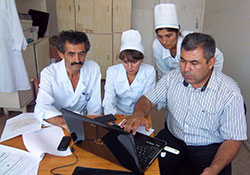Tajikistan introduces national tuberculosis database

WHO/Sayohat Hasanova
WHO/Europe has provided technical assistance to the Ministry of Health to develop and introduce a national tuberculosis (TB) database, and improve the country’s surveillance, recording and reporting system for TB.
In Tajikistan, demand is increasing for good quality health information for data presentation, decision-making, analysis and planning. Standard TB suspect/case management forms are maintained at the district level, and generally follow DOTS (directly observed treatment, short-course), the strategy recommended by WHO for TB control. Before the introduction of the new database, however, the contents of the TB case management forms and electronic and paper TB registries were inconsistent. Documentation was poorly managed and it was difficult to find data for simple cohort analysis.
The new TB database
Open-source medical record software, OpenMRS, was introduced and piloted for the management of multidrug-resistant (MDR) TB, during the first stage of the project. OpenMRS is a web-based data management tool for the surveillance, reporting and recording of drug-resistant TB cases, monitoring of treatment outcomes, management of laboratory results and use of TB medicines. It allows decision-makers to obtain a detailed analysis of TB patient data, treatment outcomes and TB trends. This work was done in collaboration with Innovative Research and Development (IRD) and based on the WHO recording and reporting system for countries.
Challenges that emerged at the initial stage included the lack of electricity in the winter, problems with the internet connection and a lack of people trained to use the software. These challenges were taken into account and addressed when a step-by-step plan to extend the project was developed. Additional information technology equipment was procured and a number of training events were held at the oblast and district levels to support the expansion of the TB database system.
By the end of 2012 the database will be extended to all oblast levels and some districts with large populations.
In parallel, work is under way in collaboration with IRD to develop a module for tracking susceptible TB cases, based on WHO’s recording and reporting system. This database will be added to the MDR-TB module.
Plans include further developing the laboratory component of the database, and introducing a drug management section.



